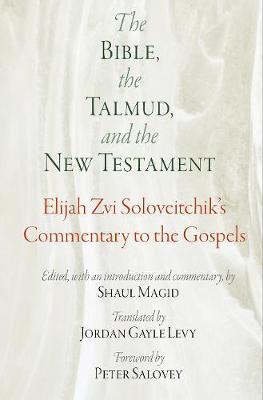The Bible, the Talmud, and the New Testament: Elijah Zvi Soloveitchik's Commentary to the Gospels

The Bible, the Talmud, and the New Testament: Elijah Zvi Soloveitchik's Commentary to the Gospels
Born in Slutzk, Russia, in 1805, Elijah Zvi Soloveitchik is a largely forgotten member of the prestigious Soloveitchik rabbinic dynasty. Before Hayyim Soloveitchik developed the standard Brisker method of Talmudic study, or Joseph Dov Soloveitchik helped to found American Modern Orthodox Judaism, Elijah Soloveitchik wrote Qol Qore, a rabbinic commentary on the Gospels of Matthew and Mark. Qol Qore drew on classic rabbinic literature, and particularly on the works of Moses Maimonides, to argue for the compatibility of Christianity with Judaism. To this day, it remains the only rabbinic work to embrace the compatability of Orthodox Judaism and the Christian Bible.In The Bible, the Talmud, and the New Testament, Shaul Magid presents the first-ever English translation of Qol Qore. In his contextualizing introduction, Magid explains that Qol Qore offers a window onto the turbulent historical context of nineteenth-century European Jewry. With violent anti-Semitic activity on the rise in Europe, Elijah Soloveitchik was unique in believing that the roots of anti-Semitism were theological, based on a misunderstanding of the New Testament by both Jews and Christians. His hope was that the Qol Qore, written in Hebrew and translated into French, German, and Polish, would reach Jewish and Christian audiences alike, urging each to consider the validity of the other's religious principles. In an era characterized by fractious debates between Jewish communities, Elijah Soloveitchik represents a voice that called for radical unity amongst Jews and Christians alike.
Born in Slutzk, Russia, in 1805, Elijah Zvi Soloveitchik is a largely forgotten member of the prestigious Soloveitchik rabbinic dynasty. Before Hayyim Soloveitchik developed the standard Brisker method of Talmudic study, or Joseph Dov Soloveitchik helped to found American Modern Orthodox Judaism, Elijah Soloveitchik wrote Qol Qore, a rabbinic commentary on the Gospels of Matthew and Mark. Qol Qore drew on classic rabbinic literature, and particularly on the works of Moses Maimonides, to argue for the compatibility of Christianity with Judaism. To this day, it remains the only rabbinic work to embrace the compatibility of Orthodox Judaism and the Christian Bible. In The Bi
PRP: 877.89 Lei
Acesta este Pretul Recomandat de Producator. Pretul de vanzare al produsului este afisat mai jos.
702.31Lei
702.31Lei
877.89 LeiLivrare in 2-4 saptamani
Descrierea produsului
Born in Slutzk, Russia, in 1805, Elijah Zvi Soloveitchik is a largely forgotten member of the prestigious Soloveitchik rabbinic dynasty. Before Hayyim Soloveitchik developed the standard Brisker method of Talmudic study, or Joseph Dov Soloveitchik helped to found American Modern Orthodox Judaism, Elijah Soloveitchik wrote Qol Qore, a rabbinic commentary on the Gospels of Matthew and Mark. Qol Qore drew on classic rabbinic literature, and particularly on the works of Moses Maimonides, to argue for the compatibility of Christianity with Judaism. To this day, it remains the only rabbinic work to embrace the compatability of Orthodox Judaism and the Christian Bible.In The Bible, the Talmud, and the New Testament, Shaul Magid presents the first-ever English translation of Qol Qore. In his contextualizing introduction, Magid explains that Qol Qore offers a window onto the turbulent historical context of nineteenth-century European Jewry. With violent anti-Semitic activity on the rise in Europe, Elijah Soloveitchik was unique in believing that the roots of anti-Semitism were theological, based on a misunderstanding of the New Testament by both Jews and Christians. His hope was that the Qol Qore, written in Hebrew and translated into French, German, and Polish, would reach Jewish and Christian audiences alike, urging each to consider the validity of the other's religious principles. In an era characterized by fractious debates between Jewish communities, Elijah Soloveitchik represents a voice that called for radical unity amongst Jews and Christians alike.
Born in Slutzk, Russia, in 1805, Elijah Zvi Soloveitchik is a largely forgotten member of the prestigious Soloveitchik rabbinic dynasty. Before Hayyim Soloveitchik developed the standard Brisker method of Talmudic study, or Joseph Dov Soloveitchik helped to found American Modern Orthodox Judaism, Elijah Soloveitchik wrote Qol Qore, a rabbinic commentary on the Gospels of Matthew and Mark. Qol Qore drew on classic rabbinic literature, and particularly on the works of Moses Maimonides, to argue for the compatibility of Christianity with Judaism. To this day, it remains the only rabbinic work to embrace the compatibility of Orthodox Judaism and the Christian Bible. In The Bi
Detaliile produsului








